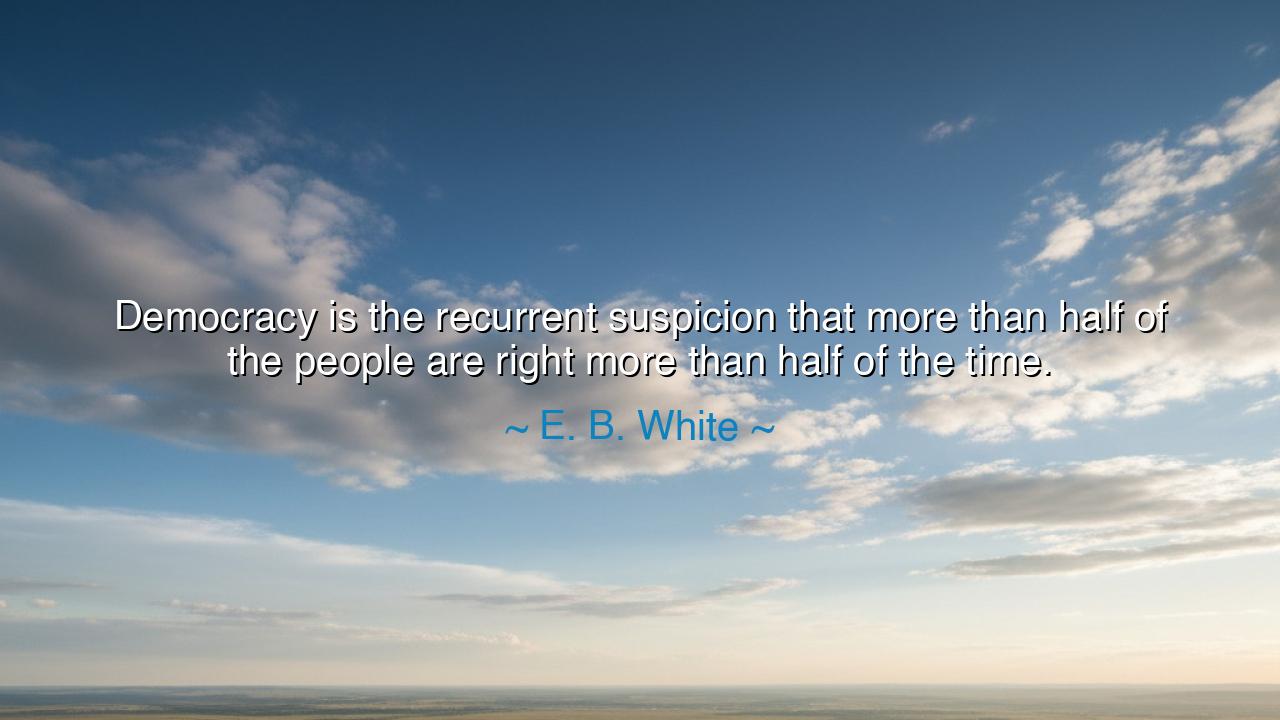
Democracy is the recurrent suspicion that more than half of the
Democracy is the recurrent suspicion that more than half of the people are right more than half of the time.






The words of E. B. White, “Democracy is the recurrent suspicion that more than half of the people are right more than half of the time,” sound at first like humor, but within them lies the hard-earned wisdom of a writer who lived through wars, depressions, and the rising storms of tyranny. White, who penned not only beloved tales like Charlotte’s Web but also reflections on society and politics, spoke with a voice at once gentle and piercing. His quote lays bare the fragile foundation of democracy: not certainty, but suspicion; not perfection, but hope that in the great balance of voices, truth may emerge often enough to sustain freedom.
The origin of these words comes from White’s essays, where he wrote with clarity about the strange, imperfect, and yet vital system of democracy. Unlike autocracy, which claims to rest upon the certainty of one person’s will, democracy rests upon the uneasy faith that the collective judgment of the people, though flawed, is wiser than any single ruler. His words remind us that democracy is not about always being right, but about being right enough, often enough, to keep liberty alive and injustice restrained. It is not the voice of angels that guides it, but the voice of humanity in all its confusion and contradiction.
To understand this, one may look to the story of Ancient Athens, where the seeds of democracy were first sown. The Athenians placed their faith not in kings, but in the assembly of citizens, knowing that error was inevitable, but that collective deliberation could restrain the madness of any one man. They stumbled often—condemning Socrates, waging reckless wars—but they also birthed philosophy, art, and the very idea of free governance. Their democracy was not perfect, but it proved that when many share in decision, justice, though slow and fragile, has a chance to breathe.
History offers another example in the American Civil Rights Movement. For centuries, the democracy of the United States was marred by slavery, segregation, and injustice. Yet through the persistence of citizens—marchers in Selma, students in Greensboro, leaders like Martin Luther King Jr.—the voice of the majority slowly shifted. At times, it seemed as though democracy had failed entirely. Yet White’s words apply: more than half the people became right more than half the time, and through this turning of hearts, laws changed, doors opened, and progress, though imperfect, was made.
The meaning of White’s teaching is that democracy is not divine perfection but human striving. It admits error, confusion, and even injustice, yet it also contains within it the power to correct itself. Where kings cling to error until nations collapse, democracy allows for course correction through the will of the people. It is fragile, yes, for the people may be deceived or divided. Yet it is resilient, for truth, though buried, rises again when enough voices demand it.
The lesson we inherit is this: do not despair at the flaws of democracy, nor worship it as flawless. Instead, participate in it, knowing it is only as wise as the people who engage in it. If we withdraw, the suspicion becomes empty; if we speak, act, and vote, we lend our portion to the great tide that may carry justice forward. Democracy is not a machine that runs by itself, but a garden that requires constant tending, lest weeds of apathy and corruption overgrow it.
Practical action flows from this wisdom. Engage with your community, seek truth rather than comfort, and honor the responsibility that democracy places upon every citizen. Do not expect it to be perfect, but help it to be better. Challenge falsehood, encourage dialogue, and remember that even your single voice, joined with others, can tip the scales of that great suspicion toward justice.
Thus, in the voice of the ancients, we proclaim: Blessed are those who keep faith with democracy, not because it is flawless, but because it is alive. Blessed are those who add their voices to the chorus, for they strengthen the chance that more than half the people will be right more than half the time. And let us remember always the wisdom of E. B. White: democracy survives not on certainty, but on the fragile, recurring hope that humanity, when gathered together, will choose the good often enough to keep the flame of liberty burning.






AAdministratorAdministrator
Welcome, honored guests. Please leave a comment, we will respond soon